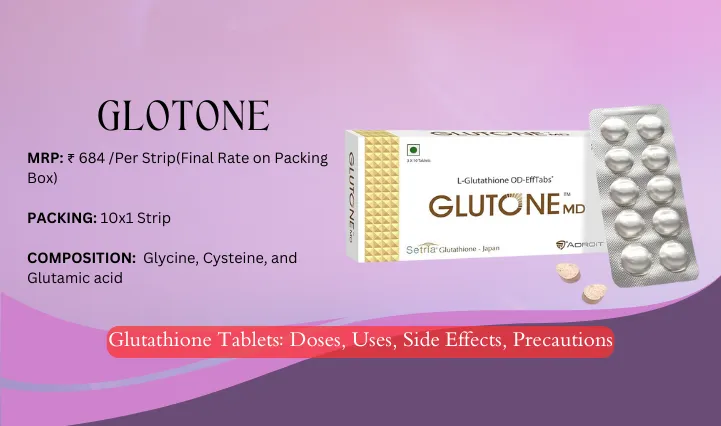Glutathione Tablets: Uses, Doses, Side Effects, Precautions
Glutathione tablets are a naturally occurring antioxidant in the body that plays a crucial role in maintaining overall health. It does this by –
- Detoxification
- Helping maintain skin health
- Maintaining skin complexion and tone
- Supporting the Immune system
- Anti-aging and repair in the various cells that are a part of the human body.
The Glutathione tablets are supplements that contain the synthetic version of the Glutathione produced in the body.
Glutathione Tablets Working
Glutathione works in many different ways. It helps with detoxification because of free radicals. Free radicals are unstable molecules floating around in the human body that can damage the various cells in the body. Vitamin C and Vitamin E helps with this.
In the liver it binds to the toxins, making it water soluble and easier to eliminate through urine and bile. It helps in the elimination of substances such as heavy metals, pollutants, and harmful chemicals.
When it comes to skin tone and pigmentation, it reduces melanin production by inhibiting tyrosinase. This medication works more effectively when it is combined with Vitamin C.
Further, it helps the immune system by enhancing the functioning of white blood cells. It protects these cells from oxidative stress and inflammation. As it promotes healthy cell functioning, it slows down skin aging, wrinkles,and fine lines.
Glutathione Production In the Human Body
Glutathione is synthesized in the liver, with the help of three key components and these are –
- Glutamate
- Cysteine (the most crucial for glutathione production)
- Glycine
The conversion of these components to Glutathione is a two step process. The first step is the combination of Glutamate and cysteine with the help of glutamate cysteine ligase (GCL). In the next step, Glycine is added by the enzyme glutathione synthetase to form glutathione.
How To Increase Glutathione Levels Naturally
Glutathione levels can be increased naturally in the body by –
- Adding garlic, onions, broccoli, Brussels sprouts, cabbage, and kale.
- Increasing protein intake
- Consuming foods rich in vitamin C and healthy nuts
- Regular exercise
- Reducing alcohol and processed food intake
Glutathione Tablet uses
An individual takes Glutathione tablets for a wide variety of reasons. These reasons are as follows,
- Skin whitening and brightening – This compound inhibits melanin production and leads to a lighter and even toned skin. It is oftenly taken with Vitamin C tablets to enhance the effectiveness of Glutathione Tablets.
- Liver health and detoxification – It is used to treat diseases such as fatty liver and hepatitis.
- Healthier skin and Anti-ageing – Helps reduce pigmentation, dark spots, and wrinkles.
- Supporting Immune system, heart, and neurological health – It helps protect against diseases such as Parkinson’s disease.
Glutathione Tablet Doses
For overall health a 250 mg to 500mg can be taken daily. For the purpose of skin whitening 500 mg to 1000 mg and is often paired with Vitamin C. Even though this medication is a supplement, you should consult a doctor.
Glutathione Tablets Adsorption
The tablets have low bioavailability of Glutathione. This means that the body takes time to absorb this medication. Sometimes liposomal formulations (encasing on the medication in fat molecules) is used to make this medication to help improve the adsorption of this medication.
N-Acetyl Cysteine (NAC) supplements in some cases are a more effective way to add glutathione as they help the body produce glutathione naturally.
Glutathione Tablet Side Effects
- This medication is generally safe, but some people may experience some side effects. These side effects are as follows –
- Skin rashes or allergies
- Digestive issues (bloating, nausea, or diarrhea)
- Lowered zinc levels with prolonged use
- Breathing problems (rare, mostly with IV form)
Reasons For Low Glutathione Levels
Glutathione may decline in the body due to the following natural reasons –
- Delicine in levels after 40 years of age due to the body’s natural aging process
- Lack of a balanced diet
- Chronic stress
- Exposure to pollution, alcohol intake, smoking, and heavy metals
- Certain medical conditions such as liver disease, diabetes, cancer, neurodegenerative disorders
How Long Do Glutathione Tablets Take to Work?
- For skin lightening: 1 to 3 months (visible results vary by skin type and dosage).
- For detox & general health: Effects may be noticed in a few weeks.
- Works faster when combined with Vitamin C, a healthy diet, and hydration
Frequently Asked Questions
Ans. Pregnant or breastfeeding women should avoid this medication as the side effects of this medication are not known for pregnant women.
Ans. Some of the risks include –
1. Formation of air bubbles in the blood vessels
2. Sepsis
3. Kidney dysfunction
4. Thyroid dysfunction
These risks are often due to improper administration of IV or administration of fake glutathione.
Ans. Glutathione can’t be used to treat Parkinson’s disease, as its risks and benefits have not been assessed for the treatment of Parkinson’s disease.
Disclaimer: The information on this blog is strictly for informational purposes. It is not a substitute for professional medical advice. Please consult your doctor before taking any medication.

